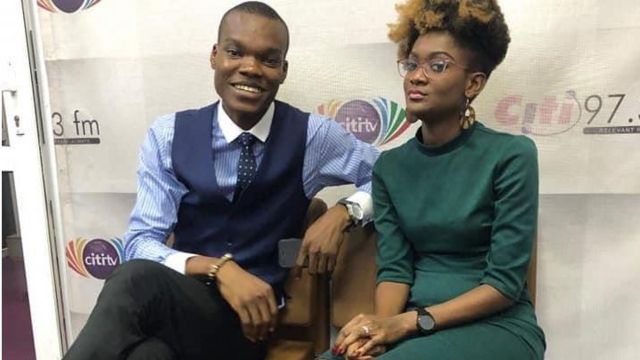The Media Foundation for West Africa condemns the invasion of Citi TV premises by seven armed security officers on May 11, 2021, in an attempt to arrest Zoe Abu-Baidoo, a journalist with the Accra-based media organisation.
The female broadcast journalist had been accused of receiving some video files from her colleague, Caleb Kudah, who had earlier been arrested over ‘unauthorised’ filming of some vehicles on the premises of the Ministry of National Security.
The rifle-wielding police officers stormed the premises of the broadcast station and went straight after Zoe Abu-Baidoo who was at the car park. Sensing danger, the journalist ran into the main building, while the police officers pursued her. The incident threw the whole office into panic and disrupted work momentarily.
Following the intervention of the media organisation’s Chief Executive Officer, Samuel Attah-Mensah, the police agreed for the journalist to be accompanied to the Ministry of National Security for interrogation. The journalist was released after about two hours, with her colleague Caleb Kudah being released much later the same day.
The General Manager of Citi TV/Radio Bernard Avle said the armed invasion and arrests was a traumatising experience for the journalists and left the staff in shock.
“Besides we are a recognised media house and you know people here, so if you want to talk to Zoe about information she has, this is not the way to do it,” Avle told citinewsrooom.com.
This kind of drama is not one you would normally associate with Ghana. Arresting a journalist and pursuing another into a newsroom with seven heavily armed security officers is a classic feature of a dictatorship and it is an embarrassment for Ghana to project itself this way to the world.
The MFWA cannot see how the filming by a journalist of the National Security Ministry building, which is a public institution accessible to the public, can constitute a national security breach. Indeed, journalists have the right to film even private property when it is the scene of an activity or is associated with an event that is of public interest to publicise.
Over the years, we have seen a number of incidents in which security officers have assaulted or arrested journalists for filming their operations conducted in public. This is a blatant abuse of authority and must be checked.
Musah Tanko Zakaria, a journalism lecturer and legal practitioner told the MFWA that “the police can restrict journalists’ work including filming only on grounds of public safety, or when the journalists trespass into areas designated as security zones, interfere with an arrest, violate privacy rights, or otherwise fail to respect legitimate measures by law enforcement to control riots or disorder or prevent interference in their operations. In all cases, the restriction should be proportionate and legitimate and aimed at achieving a specific objective that is in public interest.”
The Rambo-style storming of Citi FM revives memories of a raid in 2019 on the offices of the online media organisation, ModernGhana.com, also by National Security operatives. The invading officers seized mobile phones and carried away computers after arresting two journalists of the media outlet, one of whom reported being tortured in detention.
Security officers’ propensity for attacks on journalists covering their activities on journalists in Ghana is becoming too frequent. The Citi FM incident came just three days after security officers brutalised Peter Tabiri, a correspondent of Pent TV in Asankragua in the Western North Region. The security officers had overhead the journalist reporting on phone to another person their raid on a casino. The journalist was actually reporting the raid to the Amenfi Divisional Commander of Police who later revealed to the MFWA that the officers involved were not from or under his jurisdiction.
On January 14, 2021, a police officer, Sergeant Solomon Tackie, arrested and detained Selorm Gborbidzi, a reporter of the Accra-based The Finder newspaper for filming a scuffle between him and a driver of a commercial vehicle.
On April 15, 2021, some soldiers assaulted journalists who were covering a demonstration at La in Accra. The victims included Nii Ayikwei who works with Citi FM/TV and Desmond Osae Amponsah of TV Africa. The member of parliament of the area berated the assault on the journalists.
“The residents and some journalists have been assaulted, and I don’t think this augurs well for us as a nation,” the lawmaker said during an interaction with the media a day after the incident,” the MP for La Dadekotopon, Rita Naa Adoley Sowah, lamented at a press conference a day later.
On August 12, 2020, a soldier identified as Lieutenant Frimpong attacked Stanley Nii Blewu, a cameraman with TV3 at the Tema Station in Accra. The soldier, who was enforcing a clean-up exercise at the bus terminal, also seized Blewu’s camera and the phone of Joseph Armstrong, also a reporter with TV3, before deleting all recordings from the gadgets.
Incidents like these have contributed to a decline in Ghana’s press freedom ranking from being first in Africa and 23rd in the world in 2018 to 3rd and 30th respectively over the past three years.
“It is about time we had a national dialogue to come to clarity regarding the rights of journalists to cover the security services in order to end the conflicts over filming and recording,” Zakaria added.
The MFWA is extremely concerned about these press freedom violations by security officers and urges the National Security Minister, the Minister of Defense and of the Interior to call their men to order. The media plays too crucial a role in our democracy for it to be left at the mercy of overzealous security officers. Also, given these violations can undermine Ghana’s press freedom environment and lead to self-censorship, we urge the Minister of Information to take steps to get to engage the actors involved in order to reverse the trend.





